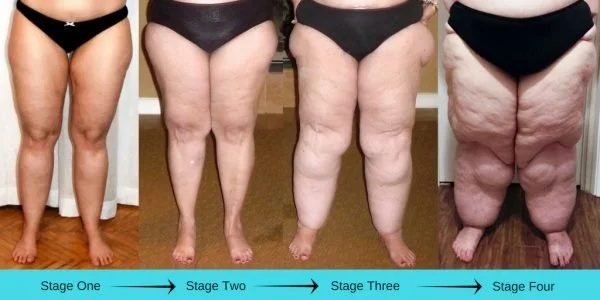“Have you tried losing weight?” An overview of Lipedema
My first answer to that question, which happens to be my answer to many things, is why don’t you mind your own business?
Getting to the medical answer to that question—in life…and in bodies, there’s often more than meets the eye. As a professional bodyworker, I have seen and worked on so many different body types, and clients with many different physical conditions or diseases. In my training as a lymphedema therapist in 2018 I first learned of a condition called lipedema; sometimes called lipoedema. You have probably come across dozens of people in your life that have lipedema and you had no idea. Likely, THEY had no idea either. It is a little-recognized and often misdiagnosed condition that many mistake for the individual “just needing to lose weight”, or “do you mean lipidemia/lymphedema?”. “Have you tried losing weight?” is a question they’ve heard all their lives as well, from family, friends, strangers, and even medical professionals they’ve put their trust in. While these conditions (lipedema, lipidemia, lymphedema) all sound similar, there are marked differences among them. This blog aims to bring attention to LIPEDEMA—a chronic condition characterized by abnormal accumulation of fat cells, often accompanied by pain, swelling, loss of mobility and more.
The truth is, around 11% of women in the US are afflicted by Lipedema. No amount of diet or exercise will change this diagnosis. That’s not to say there’s no hope for a better life for those with this disorder, and it is even possible to make major improvements with time, patience, the right medical providers and lots of work (see resources below), but here are some basic facts:
ABNORMAL accumulation of fat, particularly around the butt/thighs/calves, disproportionate to the rest of the body
Uneven indentations in the skin; severe cases involve painful nodules and lobules
Severe cases can lead to lymphedema and/or limited mobility
Occurs almost exclusively in women
Cause not fully known, but thought to be triggered by a hormonal event (puberty, pregnancy, menopause, etc.)
Weight loss is very difficult, and does not change the disproportionate accumulation of fat cells
Other associated signs & symptoms: swelling, hypermobile connective tissue causing joint pain and instability, heavy feeling in legs, severe fatigue
In addition to the physical discomfort and limitations associated with lipedema, those living with it often experience great mental and emotional turmoil. Being ridiculed, criticized, false assumptions they are simply lazy and overeating—all lead to feelings of unworthiness and self-consciousness, depression, anxiety, and social withdrawal.
To date, many medical professionals are still unfamiliar with this condition and may provide little guidance to those suffering from it, aside from recommending dieting and weight loss. It may also be misdiagnosed and treated as general obesity, or lymphedema. As mentioned above there are reliable resources and even medical professionals that specialize in fat disorders that can help!
I can think back now on many times I saw individuals before learning about lipedema, that I’m now certain have it, and wish I would have known then to help guide them toward a better quality of life. My hope in writing this is that it will 1. Reach individuals that have lipedema and don’t know it 2. Reach healthcare and medical professionals so they can be more informed to help patients that have lipedema 3. be a PSA to all that often there are underlying issues causing what we see on the outside (and also, mind your business)
Treatments that are promising to help mitigate the effects of lipedema
(including self-care):
wearing compression garments
dietary changes
exercise (water-based exercise is great!)
professionally administered or self-lymphatic drainage
professionally administered or self-myofascial work
supplementation
surgery to remove excess fat
Resources
If you think you may have lipedema and are not sure where to start, please reach out to one of the above listed providers. Help is out there, and you are not alone!
This blog is intended for awareness and educational purposes only and not meant as medical advice. Please consult a physician that SPECIALIZES in lipedema—it is too often shrugged off or misdiagnosed by primary care physicians and even lymphedema therapists. Try a second opinion if your gut tells you you’ve been misdiagnosed. As a licensed massage therapist, the author is not able to diagnose conditions and diseases, including lipedema. However, guidance to the proper healthcare professionals in pursuit of diagnosis can be provided.

